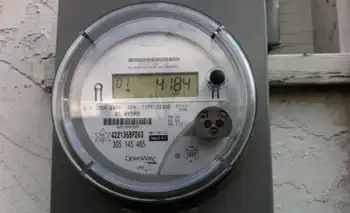Emails reveal DukeÂ’s rising worries
By Indianapolis Star
Arc Flash Training - CSA Z462 Electrical Safety
Our customized live online or in‑person group training can be delivered to your staff at your location.

- Live Online
- 6 hours Instructor-led
- Group Training Available
Labor costs were rising. Late deliveries were slowing things down. The plant needed far more steel, concrete, pipes, valves, wire and cable than the original engineering studies had estimated.
"I'm recalling the annoyances and grievances I've had with the many contractors who have worked on our various homes over the years," the Duke Energy executive, James L. Turner, wrote in an e-mail Sept. 7, 2009, to David Lott Hardy, then-chairman of the Indiana Utility Regulatory Commission. "Scale those issues logarithmically, and you have a $2.35 billion construction project."
A few weeks later, a 200-ton column fell as it was being hoisted into place at a steam generator. No one was hurt, but the accident caused another delay.
"Nothing about this project feels normal," Turner wrote to Hardy afterward, according to e-mails obtained by The Indianapolis Star.
There were good reasons for concern. With every delay or setback, the project's price tag climbed higher, and the company has won permission to pass along much of that increase in the form of higher electric bills to hundreds of thousands of customers, from households to steel mills.
But now, with the project coming under growing scrutiny, Duke Energy is being pressured to justify the costs. The plant's construction costs have soared to $2.9 billion, more than double the original estimate of $1.2 billion.
Some critics accuse the company of lowballing the original estimate to win public approval. Some have compared the plant's technology to a "science project," saying it's an unproven, costly endeavor.
Earlier this month, a group of large industrial customers demanded that Duke renegotiate terms of an agreement over the latest round of cost overruns, worth about $530 million. Duke agreed to reopen the settlement and said public hearings could start by March.
The outcome could result in the company swallowing more of the overruns, rather than passing them along to ratepayers.
With so many setbacks and overruns, some say the Edwardsport project is eerily reminiscent of another troubled Indiana energy project from nearly three decades ago. In 1984, the Marble Hill nuclear power station in Madison, which was more than half completed, was halted for cost and safety reasons. The price of building the plant had soared from an initial estimate of $770 million to more than $2.5 billion.
The principal builder of Marble Hill was Public Service Co. of Indiana, which was later bought by Cinergy, which was merged into Duke Energy.
"I would say these two projects are extremely similar in the way they were mishandled," said John Blair, president of Valley Watch, an environmental group based in Evansville. "The companies lowballed the construction costs at the beginning and got a lot of public support. Then, lo and behold, the costs skyrocketed."
Duke repeatedly has denied that it has hidden the true costs of Edwardsport. The company said it has managed the project properly and let regulators know about cost and construction problems as they arose.
The rising costs at Edwardsport have grabbed headlines for years, nearly since the plant was first approved in 2007.
And numerous e-mails between Hardy and Turner suggest that Duke was putting pressure on its engineering vendor, Bechtel Corp., to keep the project under control.
"We're throttling Bechtel," Turner wrote to Hardy on Sept. 2, 2009. "More work to do on that score."
A spokeswoman for Bechtel Corp., one of the world's largest engineering consulting firms, declined to comment specifically on the e-mail.
"Bechtel values each of its customers," company spokeswoman Michelle Allen said in an e-mail. "We are committed to helping our customers achieve their goals of developing successful projects."
A few months later, Turner was perturbed by rumors of criticism on how the project was going. He apparently had gotten wind that Hardy had criticized Duke's handling of the Edwardsport project.
"You didn't really call us incompetent at Edport in a public event this morning?" he asked Hardy in an e-mail sent Feb. 16, 2010, using shorthand to refer to Edwardsport.
A few hours later, Turner sent Hardy something of an apology. "I had a subsequent clarification of what was said," Turner wrote. "Sorry for the eruption. Just very sensitive and concerned and therefore paranoid at the moment."
Hardy responded that he had "tried to make" a point to an unspecified audience that the Edwardsport project required rigorous management, because announcing repeated cost overruns would result in "allegations of incompetence by opponents."
For Turner, president and chief operating officer of Duke's U.S. franchised electric and gas division, a chunk of his compensation package depended on his ability to keep the work on schedule and on budget, according to a review of the company's executive compensation plans.
Three years ago, according to the company's proxy statement, one of Turner's goals was to provide "leadership on major projects, including... Edwardsport."
But during the past two years, when problems were mounting, the issue of keeping a tight rein on costs at Edwardsport was no longer specifically mentioned among Turner's performance goals.
Turner earned $870,000 in incentive pay in 2007. That figure dropped to $430,000 in 2008 but shot back up to $870,000 in 2009, even as the Edwardsport plant was mired in cost overruns.
Duke spokesman Tom Williams said Turner's performance goals were set by James Rogers, the company's chairman and chief executive, and changed from year to year depending on overall corporate needs. He added that only a small part of Turner's incentive pay, about 20 percent, was based on his individual goals. The vast majority was based on the company's performance.
The Edwardsport plant is one of the most expensive projects in Indiana history. It would be the first commercial-scale gasification plant in the country when it starts operating in 2012.
Early on, opponents warned state regulators that Duke was underestimating the costs of the plant, then pegged at $1.985 billion. But the company said it had confidence in the figure.
"The estimate was rigorous and performed by seasoned personnel using accepted estimating techniques," John J. Roebel, a Duke senior vice president for engineering and technical services, said in testimony before the IURC. "In my opinion, the estimate is reasonable."
Less than six months after state regulators approved that price, Duke sounded the alarm. It said that "higher than anticipated" inflationary increases on major pieces of equipment, rising contract costs from major vendors and design changes would push the price to $2.35 billion.
A group of citizens and environmental groups shot back. "Duke continues to understate the likely and substantial increase in costs," the groups said in testimony to the IURC on Sept. 18, 2008.
Nevertheless, the IURC later approved the new price, allowing the company to pass along the higher costs to customers. The ruling cleared the way for Duke to raise rates by 18 percent over five years.
Less than a year later, Duke came back to the state seeking another large increase. The company said the plant had grown more complex than original studies estimated, and it required more steel, piping, electric cable and other materials than originally expected.
The company pointed out that this is the first time that coal-gasification technology has been used on this scale.
"Obviously, in hindsight, we were wrong about the cost estimate," Turner told the IURC.
Critics said Duke should have known better.
"Of course Duke had reason to believe costs could spiral," said Kerwin Olson, program director of Citizens Action Coalition, a group that wants construction halted.
The company was able to reach a tentative settlement with key consumer groups that would cap the Edwardsport project's costs at $2.975 billion.
But the agreement unraveled earlier this month when several parties, upset by the disclosure that Turner and Hardy were trading frequent e-mails, said they had doubts about the integrity of the process. They demanded negotiations start over.
The plant has been rocked by revelations in recent months of chummy, inappropriate communications between key players. Earlier this month, Turner resigned suddenly, effective today, after The Star disclosed some compromising e-mails to Hardy, then the state's utility regulatory chief.
Hardy was fired in October for his role in a related ethics scandal involving Duke and has recently been hospitalized for undisclosed health issues.











